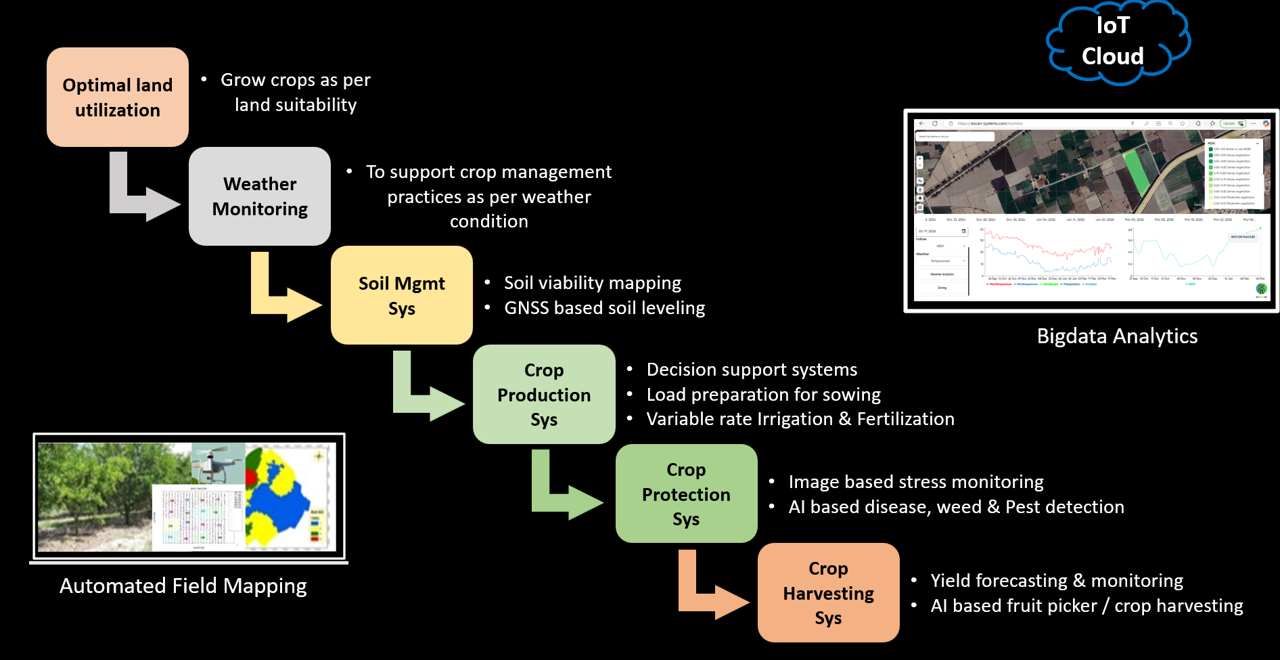
Introduction
By 2050, the world’s population will reach nearly 10 billion, demanding a 70% increase in food production. Traditional farming struggles with climate change, resource depletion, and rising costs.
Precision agriculture—powered by AI, IoT, and smart farming technology—offers a solution. It optimizes yields, cuts costs, and reduces environmental impact by using data-driven decision-making.
What is Precision Agriculture?
Precision agriculture tailors farming practices to specific crop and soil needs, reducing waste and maximizing efficiency. It ensures resources like water, fertilizer, and pesticides are used only where needed, increasing yields while lowering costs.
Key Technologies Driving Smart Farming
- Satellite & Drone Imaging – Monitors crop health, detects pests, and improves irrigation. Please read The Ultimate Guide to Crop Monitoring in Precision Agriculture for further insights
- AI & Machine Learning – Predicts weather, detects diseases, and tracks carbon management in agriculture
- IoT Sensors – Measure soil moisture, temperature, and nutrients for real-time adjustments
- Drones & Robotics – Perform precision spraying, automated seeding, and crop scouting
Benefits of Precision Agriculture
Higher Yields & Lower Costs
- Targeted irrigation & fertilization increase productivity
- 30-40% reduction in water & input waste
- AI-powered decisions optimize planting & harvesting
Sustainable Farming & Carbon Management
- Less chemical runoff protects soil & water
- Carbon tracking tools help farmers earn carbon credits
- Efficient land use lowers environmental impact
Risk Mitigation & Climate Resilience
- AI predicts droughts, pests & extreme weather for early action.
- Sensor-based monitoring detects crop stress before damage occurs.
- Climate-smart strategies improve long-term farm sustainability.
Contributions of Precision Agriculture
Farmers
- Boost yields & profits by applying water, fertilizers, and pesticides only where needed.
- Reduce waste and save costs on chemicals, labor, and fuel.
- Use real-time data to make informed planting and harvesting decisions.
Policymakers
- Use data-driven insights to improve food security policies and sustainability planning.
- Support carbon credit programs for farmers who adopt climate-smart agriculture.
- Improve resource management by analyzing regional crop trends & water usage.
Environmental Organizations
- Track carbon footprints and promote sustainable farming initiatives.
- Use satellite and sensor data to monitor soil health and biodiversity impacts.
- Encourage adoption of climate-smart agriculture to combat climate change.
The Future of Precision Agriculture
With AI, machine learning, and automation, precision farming is evolving rapidly. Expect innovations like:
- Autonomous farm equipment
- Blockchain for food traceability
- Advanced carbon tracking for climate goals
Ready to Embrace Smart Farming?
Are you a farmer, policymaker, or environmental advocate looking to optimize yields and drive sustainable farming? Now’s the time to act!
- Stay updated! ESS | MONITORING for the latest insights on precision agriculture.
- Need expert advice? Contact Earth Scan Systems and discover how AI-driven farming can transform your operations.


